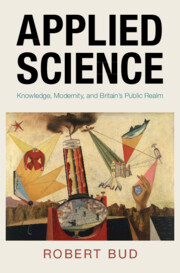Book contents
- Applied Science
- Science in History
- Applied Science
- Copyright page
- Dedication
- Contents
- Figures
- Acknowledgements
- Introduction
- Stage 1 Origins and Pedagogy in the Nineteenth Century
- 1 Applied Science Conceived
- 2 Applied Science Institutionalised
- 3 Competing Concepts of Applied Science and Technology
- Stage 2 Research in the Early Twentieth Century
- Stage 3 After World War Two
- Archives Used
- References
- Index
3 - Competing Concepts of Applied Science and Technology
from Stage 1 - Origins and Pedagogy in the Nineteenth Century
Published online by Cambridge University Press: 15 March 2024
- Applied Science
- Science in History
- Applied Science
- Copyright page
- Dedication
- Contents
- Figures
- Acknowledgements
- Introduction
- Stage 1 Origins and Pedagogy in the Nineteenth Century
- 1 Applied Science Conceived
- 2 Applied Science Institutionalised
- 3 Competing Concepts of Applied Science and Technology
- Stage 2 Research in the Early Twentieth Century
- Stage 3 After World War Two
- Archives Used
- References
- Index
Summary
In the era of the colleges’ foundation around 1880, ‘applied science’ dominated the space between science and practice in British education. However, ‘technology’ was an increasingly popular competitor. These two categories of knowledge were associated with different institutions and classes of students, and between the 1870s and World War Two, educators treated the two as complementary. So, this chapter asks how ‘technology’ was used in this period and how it related to ‘applied science’. ‘Technology’ was popularised by the technical education examined first by the Society of Arts and then by the City and Guilds. While carefully differentiated from workplace apprenticeship, it was much more practical than applied science. Government concern not to interfere with the free market and industrial anxieties about proprietary knowledge defended the divide. In the early twentieth century, emulating American and German models, ‘higher technological education’ taught at its own elite centres, particularly at Imperial College, in Manchester, and in Glasgow, came to be differentiated from technical education.
Keywords
- Type
- Chapter
- Information
- Applied ScienceKnowledge, Modernity, and Britain's Public Realm, pp. 66 - 90Publisher: Cambridge University PressPrint publication year: 2024

